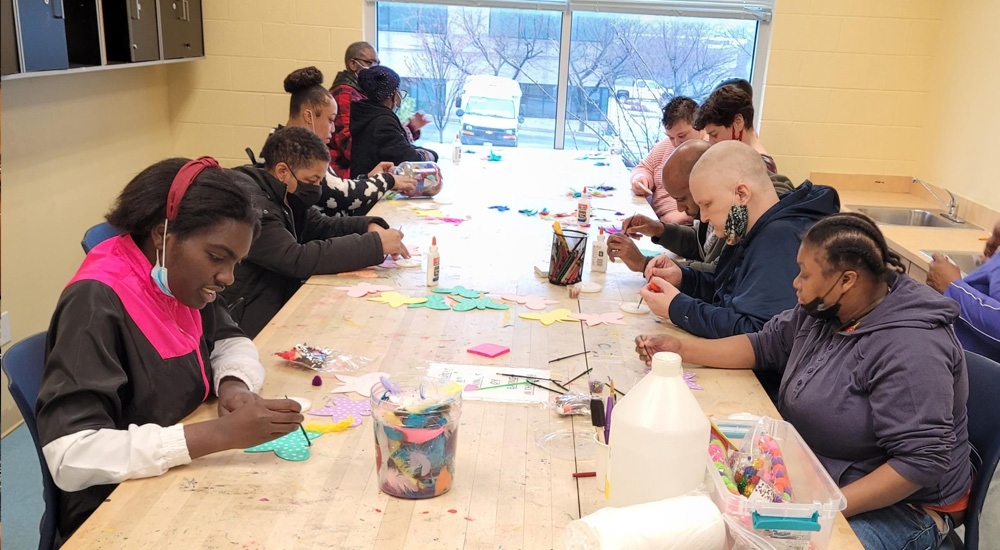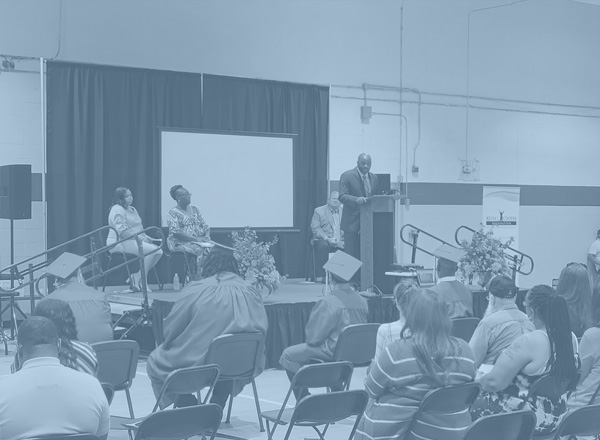About YIT School

Our Mission
“To provide a structured learning environment that will support the maximum development of each student.”
Inquiries or record requests should be sent to karen.shannon@ncianet.org
Youth In Transition School (YIT) is approved by the Maryland State Department of Education as a Type I full day special education program for students ages 11-21, with autism, emotional disabilities and/or intellectual disabilities. The school addresses the students’ physical, psychological, intellectual, and social needs. We are dedicated to changing lives.
School Goals
Youth in Transition School believes that the responsibility of education is to provide all students with the basic skills needed for a useful and fulfilling life. This can only be accomplished by developing the fullest potential of each student. We recognize the individuality of each child and that each student can make a unique contribution to society. The educational needs of each individual vary and we strive to deliver exceptional services to every student.
Simply stated, our goals are to:
- Provide a safe environment for students to achieve success in school and in the community
- Provide special education classroom instruction and related services
- Work with students, their families, and local educational agencies toward moving students to their least restrictive environment
For more information, please contact us: 410.780.1439
Academic Programs
The Youth in Transition School provides a quality, all encompassing, educational program dedicated to addressing the needs of diverse learners. It is through this program that students develop the content knowledge, skills, attitudes, and competencies that will assist them in reaching their full potential as life-long learners and productive citizens. Through this comprehensive program, children and youth with disabilities have access to the appropriate services and educational opportunities to which they are entitled under federal and state laws.
High School Program
Youth in Transition provides students with academic, art/physical education courses, and elective programming that meet requirements for a high school diploma or certificate of completion. Youth in Transition follows the Maryland College and Career Readiness Standards (MCCRS) and local school systems to provide a comprehensive educational experience.
Middle School Program
Youth in Transition’s Middle School program serves grades six to eight. Students focus on acquiring academic skills in the main content areas which include Reading and Language Arts, Mathematics, Science, and Social Studies. Youth in Transition follows the Maryland College Career Readiness Standards (MCCRS) and local school systems. Students rotate through special subject areas such as Art and Physical Education.
Vocational Opportunities
The staff at YIT are committed to helping students identify vocational opportunities that align with their interests and current goals. Students work in on and off campus jobs (including volunteer opportunities) to enhance their job readiness skills. Potential job sites include the automotive center, school kitchen, school store, front desk as well as off campus opportunities identified by the transition coordinator, student and IEP team.
Therapeutic Programs
Our therapeutic staff provides services to students in a variety of therapeutic settings including the educational and vocational classrooms, small groups, and individual sessions. We use the latest techniques and technologies to provide state of the art treatment and evaluation techniques to assist our students in maximizing their educational goals.
Counseling Services
Youth in Transition School provides counseling services for students according to the individualized education plan. Our professional staff works directly with the student to implement the goals and objectives of each student’s Individualized Education Plan (IEP). Clinical social workers provide our specialized counseling services as needed for social and emotional development.
Services include:
- Anger Management
- Peer Mediation
- Conflict Resolution
- Crisis Intervention
YIT provides related services in accordance with a student’s IEP. YIT ensures all students have access to the related services that are required to implement their IEP and ensure the student’s success.
Admissions
Youth in Transition School is appropriate for male and female students in grades 6–8, grades 9-12, and/or ages 11-21 who have been determined through the IEP process to have an emotional disability, intellectual disability, and/or autism. Students admitted to the school require a small, highly-structured individualized class and school setting.
In many cases, students who are referred to Youth in Transition have continuously experienced a lack of success due to behavior problems, clinical issues, and learning difficulties. These factors have often led to frustration, lack of motivation, and negative attitudes towards education. Youth in Transition is the first place where many students find academic success.
The admissions process for Youth in Transition begins with referrals from a school system. Admission is determined on a case-by-case basis by the school’s admissions team.
The school coordinates interviews with the youth and his/her family. Following this review, the Individual Education Plan (IEP) team determines if the school is effectively able to plan and implement an appropriate program for that youth.
If the student is enrolled in the school, the parent receives a copy of the school’s behavioral management plan, the school schedule, the school calendar, and a copy of the Student and Parent Handbook.
Our
Programs

Community Living/Residential
Helping adults with physical/intellectual disabilities or complex needs live independently.

Employment
Programs
Growth-focused community, facility, and virtual job training for adults with intellectual and developmental disabilities.

Day and Community-Based Services
Care for adults with physical/intellectual disabilities that nurtures physical, social, and emotional well-being.

Vocational Training Center
Helping previously incarcerated, veterans, and homeless adults secure life-changing jobs and futures.

Youth in Transition School
Helping students with autism, emotional disabilities, and/or intellectual disabilities to learn and thrive.

Criminal Justice
Services
Providing sentencing advocacy and other services for defense attorneys, defendants, inmates, and court systems nationwide.
